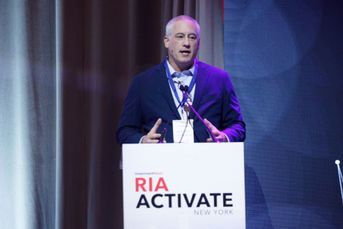Americans worried about inflation, but not as much as advisers: Survey

Americans ages 45 to 75 are worried about the dual risks of high inflation reducing spending power in retirement or a recession impacting retirement income.
Americans are afraid of facing high inflation coupled with an economic recession in retirement. Their financial advisers are even more concerned.
Americans ages 45 to 75 are worried about the dual risks of high inflation reducing spending power in retirement (81%) or a recession driving the economy down and impacting retirement income (79%), according to a study released this week by the Alliance for Lifetime Income and Cannex. That anxiety is resulting in real-world changes, as six out of 10 consumers (60%) reported reducing their spending because of inflation.
Meanwhile, a corollary study of financial professionals revealed registered investment advisers and broker-dealers are even more concerned than consumers about inflation, market volatility and the chance of a recession.
The study showed that RIAs and B-Ds are concerned that increasing inflation will reduce retirees’ spending power (92%, versus 81% of consumers), as well as that stock and bond market trends will reduce retirees’ potential retirement income (87%, versus 68% of consumers). Financial professionals are also more worried than consumers that a recession will drive the economy down and impact retirement income (84%, versus 79% of consumers).
“The chasm between consumers and financial professionals when it comes to protecting and spending money in retirement continues to confound in this latest survey,” Jean Statler, CEO of the Alliance for Lifetime Income, said in a statement.
“Against the backdrop of record inflation, a bear market and global economic uncertainty, the misalignment in what financial professionals are relying on to create retirement income, and what clients are looking for, is a problem,” Statler said. “Ninety-two percent of financial professionals are worried about inflation reducing client spending power, and so it’s good that many of them have changed their retirement planning approach this past year. But for those financial professionals who tell their clients to simply ride out the risks and are not considering protected income options like annuities, don’t be surprised if you find them going elsewhere for advice.”
That said, David Scranton, founder and CEO of Sound Income Group, doesn’t believe those in retirement or within a decade of retiring should entirely give up on holding bonds and high-dividend stocks to generate income.
“Most current planning and investment models rely on withdrawals via the possibility of capital appreciation, for which there is never a guarantee. This widely accepted approach reduces the financial planning process down to a game of financial Russian roulette for average investors, which is unacceptably risky,” Scranton said. “There has never been a more crucial moment in time for financial professionals, individuals and households to prioritize income as the cornerstone of a successful financial plan and life in retirement.”
The survey also showed that nearly four out of five financial professionals (78%) have changed their approach to retirement planning in the last year. This significant shift is largely in response to inflation, which was cited by 82% of respondents as a factor in the decision to make a change, compared to roughly half who cited other top factors, including bond returns (52%) and interest rates (48%).
“Last year’s study saw nearly two-thirds of financial professionals (65%) changing their approach to retirement planning,” Gary Baker, president of Cannex USA, said in the statement. “Fast forward to today and we see that this trend has accelerated, with a third of financial professionals more likely to recommend an annuity due to the current climate of rising interest rates, inflation and growing anxiety. Our data shows that clients are searching for an alternative to traditional asset allocation strategies, and we’re encouraged to see advisors responding to that demand.”
The study was conducted in April and May with 2,025 American consumers ages 45 to 75, and 514 financial professionals who do retirement planning for individual clients.
InvestmentNews team provides midyear takeaways
Learn more about reprints and licensing for this article.








